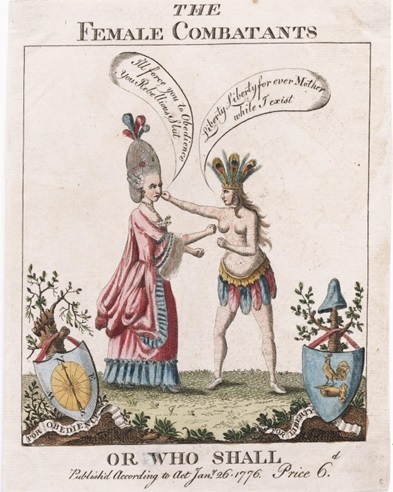Female Foes: conflict, dispute and identity in the early modern British Atlantic
About
Female Foes is a Leverhulme Trust-funded early career fellowship (2017-2021) led my Dr Naomi Pullin. Problematising recent research into female sociability, this project investigates how an emerging culture of civility and politeness in the early modern British Atlantic enhanced discussions about enmity and hostility. Focusing on women’s antagonisms in Britain and North America during the seventeenth and eighteenth centuries, it offers a new model of inquiry into female relationships by showing how female antagonism and conflict shaped early Atlantic culture. The project, which focuses on Britain and its North American colonies in the period 1650 to circa 1775 questions: who is an enemy and how they might differ from friends? How might women become enemies? How was enmity between women experienced? By centring the discussion around these central issues, this project intends to develop an important counter-narrative to traditional histories of female sociability, that embraces the tensions within and negative consequences of friendship formation.
Project description
Conflict was ubiquitous across early modern society—between states, localities, groups and families over politics, religion, the economy and social relations. While recent scholarship has drawn attention to the dynamic and innovative ways early modern women embraced friendship and created new spaces and ‘languages’ of interaction, little or no attention has been paid to the tensions resulting from these exchanges. Focusing on women’s antagonisms in Britain and North America in the seventeenth and eighteenth centuries, Female Foes constitutes a new model of inquiry into female relationships. It pioneers the history of enmity and negative female sociability and offers an important contribution to early modern gender, political and religious history by showing how female antagonism and conflict shaped early Atlantic culture.
This project investigates how an emerging culture of civility and politeness enhanced discussions about enmity and hostility. My initial research into this topic has produced substantial new evidence to show that enmity amongst women was often articulated in gendered terms, overwhelmingly in relation to sexual and familial honour. Yet how women managed their conflicts and chose to deal with their opponents was subjective and depended upon a range of factors, such as their religious affiliation, social rank and ethnic background. This study of female conflict therefore raises a number of ideas about the ways in which women’s rivalries and disputes shaped their identities. It also opens up important possibilities for considering how such expressions of female antagonism relate to the expectations of emotional comportment theorised in contemporary conduct literature. It intends to enhance the scholarship on early modern gender history and early Enlightenment sociability in four important areas:
1. Examining the relationship between friendship and enmity.
2. Investigating how women’s capacity to reassert friendship and re-establish honour compared to their male contemporaries.
3. Questioning how far religious affiliation shaped how women understood their disputes and assesses its role in creating the conditions for tension and hostility between women.
4. Exploring how social and ethnic tensions in Britain’s overseas empire created new conditions for female antagonism to be expressed in these frontier environments.
The leading outcome of this project will be a monograph exploring multiple facets of negative sociability.
Project Publications
Monograph: A Social History of Solitude in Early Modern Britain (manuscript in progress).
'Ruined and Scorned: Failed Friendships and Enmities in Alice Thornton’s Life Writings', in Cordelia Beattie and Suzanne Trill (eds.), A Companion to Alice Thornton (Forthcoming, University of Amsterdam Press, 2025).
‘Dangerous company’: Failed Friendship and the Negotiation of Exclusion in Eighteenth-Century Polite Society’, in Naomi Pullin and Kathryn Woods (eds), Negotiating Exclusion in Early Modern England, 1560-1800 (Routledge, 2021).
Naomi Pullin and Kathryn Woods (eds), Negotiating Exclusion in Early Modern England, 1560-1800 (Routledge, 2021).
‘Friends without Friends: Exile and Excommunication from Early Quakerism, c.1660-1800’, in Adrianna Bakos and Linda Levy Peck (eds), Women in Exile in Early Modern Europe and the Americas (forthcoming, Manchester University Press, 2024).
‘False Friends and Enemies’ for the DIGIT.EN.S Encylopedia of British Sociability in the Long Eighteenth Century (July 2022).‘Solitude’ for the DIGIT.EN.S Encylopedia of British Sociability in the Long Eighteenth Century (August 2021).
Project Events
20 September 2018 ‘Negative Sociability in Early Modern Britain and the Atlantic’: one-day workshop at University of Cambridge
Project Talks
29 January 2020, ‘Not made for perpetual contemplation’: the pleasures and pains of solitude in early modern Britain’, Early Modern Seminar, University of East Anglia.
4 July 2019, ‘The Negative Sociability of Women in Early Modern Britain’, Sociability in Early Modern Britain, c. 1500-1700: Who? Where? When? Why?, University of Birmingham.
28 June 2019, ‘Female Friends and Enemies in Early Modern Britain’, Civility and Incivility in Early Modern Britain, University of Oxford.
17 May 2019, ‘Contrasting Passions: Friendship and Enmity’, ‘Passions in Practice’ Workshop, University of Warwick.
8 February 2019, ‘Women’s Experiences of Conflict in Early Modern Britain’. Early Modern Women’s Roles and Identities 1500-1800, Early Modern and Eighteenth-Century Centre Workshop, University of Warwick.
22 January 2019, ‘Female Negative Sociability in Britain, 1660–1775’. Graduate Seminar in History, Lincoln College, University of Oxford.
18 January 2019, ‘Best Friends and Worst Enemies: Women’s Experiences of Conflict in Early Modern Britain’. Women’s History Seminar, Institute of Historical Research, University of London.
3 July 2018, ‘‘Unfitt for Company’: Female Sociability and Anti-Sociability in the Early Modern British Atlantic’, Society for Renaissance Studies 8th Biennial Conference, University of Sheffield.
